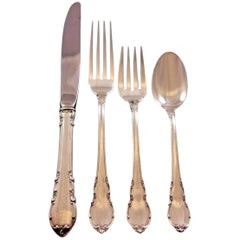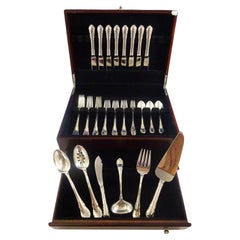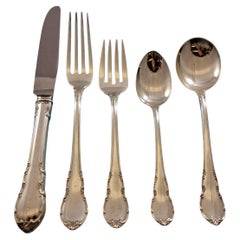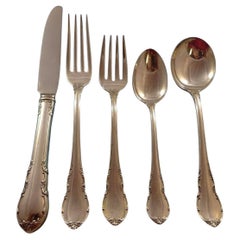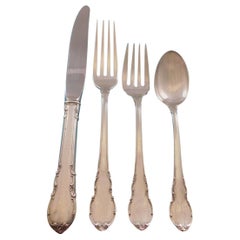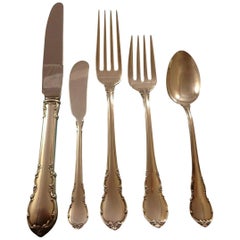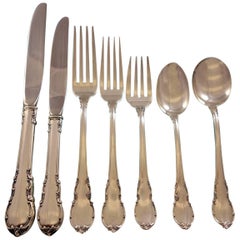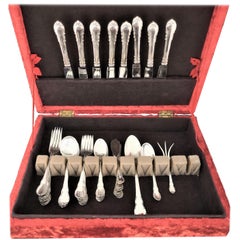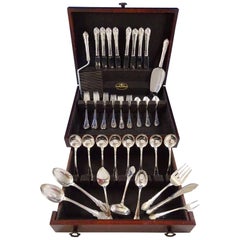Lunt Modern Victorian
20th Century Tableware
Sterling Silver
20th Century Tableware
Sterling Silver
20th Century Tableware
Sterling Silver
Mid-20th Century Tableware
Sterling Silver
20th Century Tableware
Sterling Silver
20th Century Tableware
Sterling Silver
20th Century Tableware
Sterling Silver
Recent Sales
Vintage 1940s American Victorian Tableware
Sterling Silver
Vintage 1940s Victorian Sterling Silver
Sterling Silver
20th Century Tableware
Sterling Silver
Antique Mid-19th Century Tableware
Sterling Silver
Mid-20th Century Tableware
Sterling Silver
Early 20th Century Victorian Tableware
Sterling Silver
Lunt Modern Victorian For Sale on 1stDibs
How Much is a Lunt Modern Victorian?
Lunt Silver for sale on 1stDibs
Founded in the early 20th century, Lunt Silversmiths became a celebrated domestic designer and producer of flatware, hollowware, serveware and giftware for generations, remaining in Lunt family hands for more than 100 years. It was the oldest continuously operating family-owned silver company in the United States.
Lunt Silversmiths was incorporated in Greenfield, Massachusetts, in 1902 as Rogers, Lunt & Bowlen Company. The firm succeeded A. F. Towle & Son Co. — later Towle Silversmiths — purchasing its tools, machinery, trademarks and goodwill. Lunt was originally managed by George E. Rogers, president and major investor; George Colby Lunt, treasurer and general manager; and William Caldwell Bowlen, vice president and supervisor of manufacturing until his retirement in 1929. George C. Lunt and William C. Bowlen were both qualified members of the staff of the defunct Towle's factory.
On April 4, 1912, the founders of Rogers, Lunt & Bowlen Company registered the manufacturer’s trademark at the federal level. In 1935 the company name was shortened to Lunt Silversmiths. In 1957 Lunt Silversmiths acquired King Silver Co. and its subsidiary Richard Dimes Company of South Boston, MA.
Lunt Silversmiths had in its inventory a wide array of flatware patterns such as Alexandra, American Directoire, Modern Victorian, Belle Meade, Carillon, Charles II, Chased Classic, Chatelaine, Colonial Manor, William and Mary, Contrast, Delacourt and many more. The United States government chose Lunt’s Embassy Scroll pattern (1981) as its official tableware in all U.S. embassies and consulates around the world.
In late 2009 Lunt sold its brand and inventory to Reed & Barton. The following year all remaining manufacturing and inventory assets at the Greenfield factory were sold at auction.
Find antique Lunt sterling silver flatware and other furnishings and decorative objects on 1stDibs.
(Biography provided by Schear Brothers)
Finding the Right Tableware for You
While it isn’t always top of mind for some, antique and vintage tableware can enhance even the most informal meal. It has been an intimate part of how we’ve interacted with our food for millennia.
Tableware has played a basic but important role in everyday life. Ancient Egyptians used spoons (which are classified as flatware) made of ivory and wood, while Greeks and Romans, who gathered for banquets involving big meals and entertainment, ate with forks and knives. At the beginning of the 17th century, however, forks were still uncommon in American homes. Over time, tableware has thankfully evolved and today includes increasingly valuable implements.
Tableware refers to the tools people use to set the table, including serving pieces, dinner plates and more. It encompasses everything from the intricate and elaborate to the austere and functional, yet are all what industrial product designer Jasper Morrison might call “Super Normal” — anonymous objects that are too useful to be considered banal.
There are four general categories of tableware — serveware, dinnerware, drinkware and, lastly, flatware, which is commonly referred to as silverware or cutlery. Serveware includes serving bowls, platters, gravy boats, casserole pans and ladles. Most tableware is practical, but it can also be decorative. And decorative objects count as tableware too. Even though they don’t fit squarely into one of the four categories, vases, statues and floral arrangements are traditional centerpieces.
Drinkware appropriately refers to the vessels we use for our beverages — mugs, cups and glasses. There is a good deal of variety that falls under this broad term. For example, your cheerful home bar or mid-century modern bar cart might be outfitted with a full range of vintage barware, which might include pilsner glasses and tumblers. Specialty cocktails are often served in these custom glasses, but they’re still a type of drinkware.
Every meal should be special — even if you’re using earthenware or stoneware for a casual lunch — but perhaps you’re hosting a dinner party to mark a specific event. The right high-quality tableware can bring a touch of luxury to your cuisine. Young couples, for example, traditionally add “fine china,” or porcelain, to their wedding registry as a commemoration of their union and likely wouldn’t turn down exquisite silver made by Tiffany & Co. or Georg Jensen.
It’s important to remember, however, that when you’re setting the dining room table to have fun with it. Just as you might mix and match your dining chairs, don’t be afraid to mix new and old or high and low with your tableware. On 1stDibs, find an extraordinary range of vintage and antique tableware to help elevate your meal as well as the mood and atmosphere of your entire dining room.
